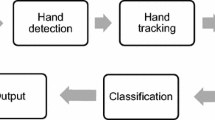Abstract
Use of gestures extends Human Computer Interaction (HCI) possibilities in multimodal environments. However, the great variability in gestures, both in time, size, and position, as well as interpersonal differences, makes the recognition task difficult. With their power in modeling sequence data and processing variable length sequences, modeling hand gestures using Hidden Markov Models (HMM) is a natural extension. On the other hand, discriminative methods such as Support Vector Machines (SVM), compared to model based approaches such as HMMs, have flexible decision boundaries and better classification performance. By extracting features from gesture sequences via Fisher Kernels based on HMMs, classification can be done by a discriminative classifier. We compared the performance of this combined classifier with generative and discriminative classifiers on a small database of two handed gestures recorded with two cameras. We used Kalman tracking of hands from two cameras using center-of-mass and blob tracking. The results show that (i) blob tracking incorporates general hand shape with hand motion and performs better than simple center-of-mass tracking, and (ii) in a stereo camera setup, even if 3D reconstruction is not possible, combining 2D information from each camera at feature level decreases the error rates, and (iii) Fisher Score methodology combines the powers of generative and discriminative approaches and increases the classification performance.
Preview
Unable to display preview. Download preview PDF.
Similar content being viewed by others
References
Ong, S.C.W., Ranganath, S.: Automatic sign language analysis: A survey and the future beyond lexical meaning. IEEE Transactions on Pattern Analysis and Machine Intelligence 27, 873–891 (2005)
Pavlovic, V., Sharma, R., Huang, T.S.: Visual interpretation of hand gestures for human-computer interaction: A review. IEEE Transactions on Pattern Analysis and Machine Intelligence 19, 677–695 (1997)
Heckenberg, D., Lovell, B.C.: MIME: A gesture-driven computer interface. In: Visual Communications and Image Processing, SPIE, Perth, Australia, vol. 4067, pp. 261–268 (2000)
Wu, Y., Huang, T.S.: Hand modeling, analysis, and recognition for vision based human computer interaction. IEEE Signal Processing Magazine 21, 51–60 (2001)
Jaakkola, T.S., Haussler, D.: Exploiting generative models in discriminative classifiers. In: Proceedings of the 1998 Conference on Advances in Neural Information Processing Systems II, pp. 487–493. MIT Press, Cambridge (1998)
Smith, N., Gales, M.: Using SVMs to classify variable length speech patterns. Technical report, Cambridge University Engineering Department (2002)
Holub, A., Welling, M., Perona, P.: Combining generative models and fisher kernels for object class recognition. In: Int. Conference on Computer Vision (2005)
Liu, N., Lovell, B.C., Kootsookos, P.J., Davis, R.I.A.: Model structure selection and training algorithms for a HMM gesture recognition system. In: International Workshop in Frontiers of Handwriting Recognition, Tokyo, pp. 100–106 (2004)
Marcel, S., Just, A.: (IDIAP Two handed gesture dataset), available at: http://www.idiap.ch/~marcel/
Chang, C.C., Lin, C.J.: LIBSVM: A library for support vector machines (2001), Software available at: http://www.csie.ntu.edu.tw/~cjlin/libsvm
Author information
Authors and Affiliations
Editor information
Editors and Affiliations
Rights and permissions
Copyright information
© 2006 Springer-Verlag Berlin Heidelberg
About this paper
Cite this paper
Aran, O., Akarun, L. (2006). Recognizing Two Handed Gestures with Generative, Discriminative and Ensemble Methods Via Fisher Kernels. In: Gunsel, B., Jain, A.K., Tekalp, A.M., Sankur, B. (eds) Multimedia Content Representation, Classification and Security. MRCS 2006. Lecture Notes in Computer Science, vol 4105. Springer, Berlin, Heidelberg. https://doi.org/10.1007/11848035_23
Download citation
DOI: https://doi.org/10.1007/11848035_23
Publisher Name: Springer, Berlin, Heidelberg
Print ISBN: 978-3-540-39392-4
Online ISBN: 978-3-540-39393-1
eBook Packages: Computer ScienceComputer Science (R0)




